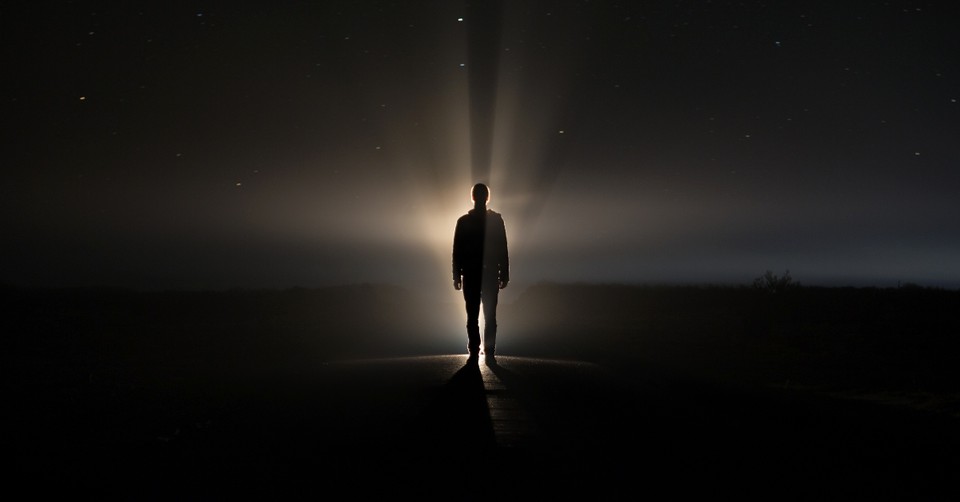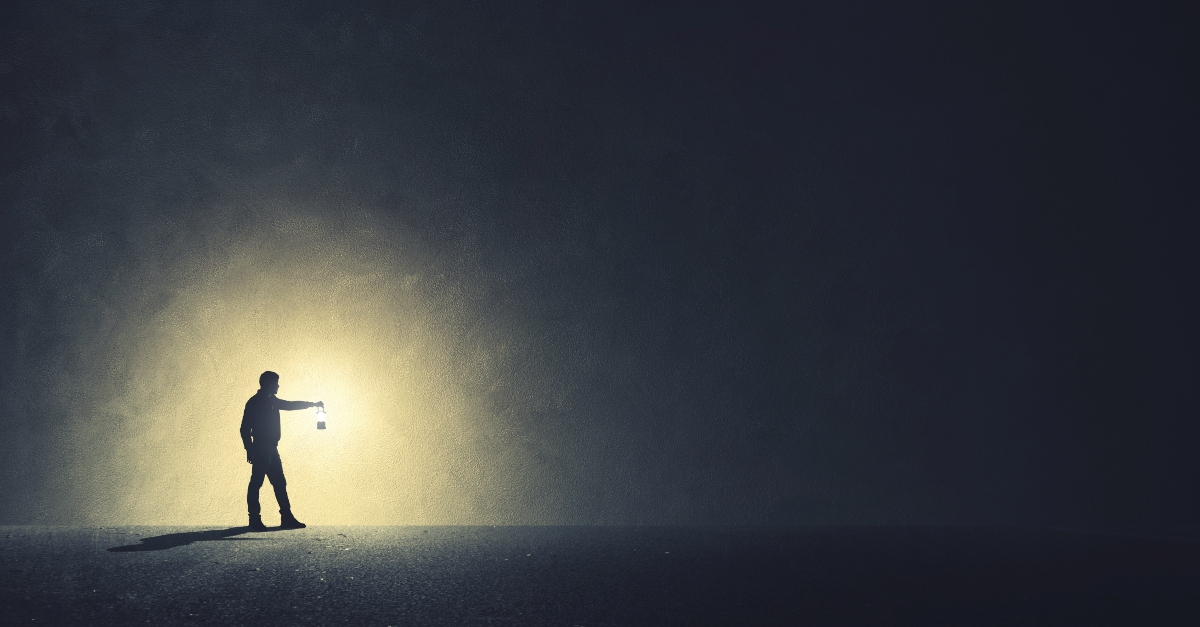Who Was St. John of the Cross?

Have you ever heard the phrase “dark night of the soul”? It’s often used to refer to an extremely difficult and painful time in one’s life. If we go through a season where we are blanketed by depression or smothered by shame, where the darkness is so thick we scarcely see the light of hope, then we might call this darkness of the soul.
This phrase can be traced back to a Spanish priest named St. John of the Cross. It is believed that his poem, La noche oscura del alma (Dark Night of the Soul), is where this phrase finds its origin. The meaning of his poem is that it is through darkness that we often find the light of Christ.
Who was St. John of the Cross, and how might this concept of a “dark night of the soul” be helpful for us today?
Who Was St. John of the Cross?
The man who became known as St. John of the Cross was born Juan de Yepes y Alvarez in 1542. He is best known for his writings, but he was also influential in the Counter-Reformation of Spain. He is perhaps the most well-known of the Spanish Catholic mystics, alongside Teresa of Ávila. He entered into the Carmelite Order in 1563 and adopted the name John of St. Mattias.
In 1567, John met Teresa of Ávila. She was involved in an attempt to reform her Order, reverting to a stricter observance of the “Primitive Rule” (established in 1209 by St. Francis) in order to follow the teaching of Jesus and walk in his footsteps. Part of this was to either go barefoot or wear only crude sandals. This is why they were dubbed Discalced Carmelites. Together, John and Teresa established a new monastery, and in 1568, John changed his name to “John of the Cross.”
As is typically the case, their desire for reform ran afoul of those who were less inclined to accept a return to the Primitive Rule. By 1577 John would be taken, by Carmelite friars opposed to reform, as a prisoner. John was accused of disobeying the ordinances of a superior. He was jailed, and received public lashings and severe isolation. He escaped in 1578 through a tiny window and was nursed back to health.
By 1580 many of the significant disputes between the Carmelites were resolved, especially when Pope Gregory XIII signed a decree which allowed for the split of the two groups. This allowed John to go his own way. He continued to establish houses and monasteries throughout the land. He died in 1591.
Two particular points of note for the life of John was his vision of the crucified Christ, where he drew a picture of Christ “from above.” This was the inspiration for Salvador Dali’s famous Christ of Saint John of the Cross.
Another significant contribution of John was his poetry. His Spiritual Canticle and Dark Night of the Soul are masterpieces of Spanish poetry. Some of his theological works were a commentary on these two poems. His work, Dark Night, outlines the steps which the soul takes through the darkness to find union with God.
Quotes from St. John of the Cross
There are some great lines throughout the works of St. John of the Cross which could be helpful for us even today. Central to John’s thought was the idea that God will propel a believer into a dark night in order to bring them into deeper union with Christ. As he says it, “God leads into the dark night those whom He desires to purify from all these imperfections so that He may bring them farther onward.”
Dark night of the soul, for John, didn’t mean quite what we think of with our use of this phrase. We think of it as a time when suffering is intense. While that might be present in his thought, for John, it means more of a journey into the unknown. Yes, it is still a difficulty—but it’s less circumstantial than we think of this dark night of the soul. Here John explains why it can be a painful experience:
But it may be asked: Why does the soul call the divine light, which enlightens the soul and purges it of its ignorances, the dark night? I reply that the divine wisdom is, for two reasons, not night and darkness only, but pain and torment also to the soul. The first is that divine wisdom is so high that it transcends the capacity of the soul and therefore is, in that respect, darkness. The second reason is based on the meanness and impurity of the soul, and in that respect, the divine wisdom is painful to it, afflictive and dark also.

Photo Credit: ©Getty Images/francescoch
John, as did many in his time, put a premium upon suffering. He believed that it was through our experience with the furnace of suffering that we would grow more in virtue:
There is another reason also why the soul has traveled safely in this obscurity; it has suffered: for the way of suffering is safer, and also more profitable, than that of rejoicing and of action. In suffering, God gives strength, but in action and in joy, the soul does but show its own weakness and imperfections. And in suffering, the soul practices and acquires virtue, and becomes pure, wiser, and more cautious.
It is through this darkness that we are able to experience and taste the beauty of Christ. The soul has to be brought into an emptiness before it can be made whole in Christ. Thus, he would say,
It is meet, then, that the soul be first of all brought into emptiness and poverty of spirit and purged from all help, consolation, and natural apprehension with respect to all things, both above and below. In this way, being empty, it is able indeed to be poor in spirit and freed from the old man, in order to live that new and blessed life that is attained by means of this night and which is the state of union with God.
These are only a few of the rich quotes that one will find going through the works of St. John of the Cross. How might he be valuable to us today?
How Can He Help Us Today?
There are some things that John might say with which I disagree. Personally, I think his ascetic views can have a tendency to move us away from the finished work of Christ, where we need our own efforts of mortification and purgation in order to be fit for receiving Christ. Yet, I must confess that some of my critique there has more to do with the way we might use John rather than his own particular views.
There also can be a bit of a Gnostic and even anti-body tendency in John. Some of his work could be at home within Buddhism, Hinduism, or other such religions. John could, at times, have a view of suffering that was almost ex opera operato, as if the mere experience of privation and this darkness of the soul will ultimately lead to a deeper experience of Christ. It can cause a believer to pursue suffering rather than endure suffering.
Yet, I do believe that the words of John would be incredibly helpful to many Christians in our day. We tend to run away from anything that even has a hint of these dark nights of the soul. If we experience them, we quickly fly away for relief. We’ve lost the ability to really sit in the ash heap of brokenness. And oddly enough, I think it causes us to experience even more brokenness and not less.
Holy Saturday is an important day. I was struck a few weeks ago when I read the passion narrative again. I was struck by the women who were preparing Jesus’ body, and they stopped. The sun was going down; the Sabbath was beginning. They had to postpone their work. But it’s also a beautiful thing that is taking place there.
You see, Sabbath is for the inconsolable things. Sabbath is when we rest. It’s when we take our hands off the plow. It’s when we acknowledge that we are finite. We have limits. We need rest. Sabbath is a reminder that God holds the world in place. Can you imagine the difficulty of this Sabbath? Jesus needs his body prepared… this is the Holy One who is not supposed to see decay. We can’t leave Him here in the tomb....no, we’ve got to work on this day.
Yet they rest. Just as only a few hours prior Jesus had entrusted His body unto the Lord, so also his disciples must now do the same thing. We place all of our hopes. All of our scars. All of the inconsolable things in the tomb. We Sabbath them.
And then we wait…
Holy Saturday is the darkest of all dark nights of the soul. And yet it is here that we find all of our hope, all the glory, and all the light. I think that is what St. John of the Cross was trying to get us to see. That there are seasons when we enter into this suffering, this darkness. We don’t take shortcuts, for it is in these dark moments that we experience a mortification of all within us that doesn’t bear the mark of Christ. And it is here that we will eventually experience resurrection.
Photo Credit: ©iStock/Getty Images Plus/Alexandra_pp
Mike Leake is husband to Nikki and father to Isaiah and Hannah. He is also the lead pastor at Calvary of Neosho, MO. Mike is the author of Torn to Heal and Jesus Is All You Need. His writing home is https://mikeleake.net and you can connect with him on Twitter @mikeleake. Mike has a new writing project at Proverbs4Today.
Originally published April 13, 2023.







